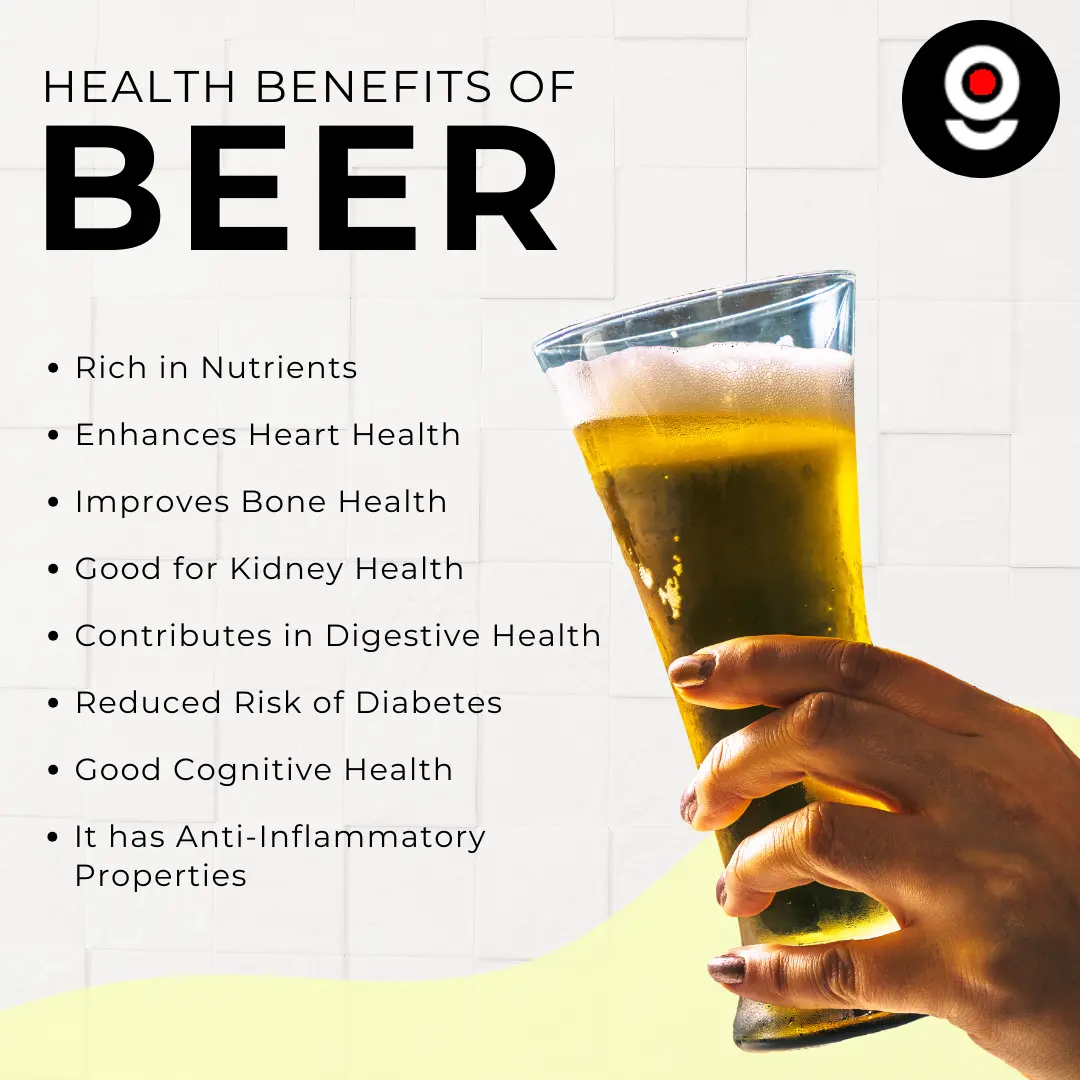Beer, one of the world’s oldest and most widely consumed alcoholic beverages, has played a significant role in various cultures for centuries. Beyond its reputation as a social lubricant, beer also boasts several surprising health benefits, along with interesting facts and potential side effects. In this article, we’ll look into the positive aspects, intriguing facts, and the precautions associated with enjoying beer responsibly.
By understanding both the positive and cautious aspects of enjoying beer, individuals can make informed choices that contribute to a balanced and enjoyable lifestyle
Nutritional Value of Beer
Nutrient | Value per 12 oz (355 ml) |
Calories | 150-200 kcal |
Protein | 1-3 grams |
Carbohydrates | 10-20 grams |
Sugars | 1-5 grams |
Fat | 0 grams |
Fiber | 0 grams |
Vitamin B6 | 0.1 mg |
Folate | 10-30 mcg |
Niacin (B3) | 1 mg |
Phosphorus | 40-80 mg |
Magnesium | 10-20 mg |
Health Benefits of Beer
Rich in Nutrients
Beer is more than just a refreshing drink; it contains essential nutrients. It’s a source of B vitamins, particularly B6, B12, niacin, riboflavin, and folate. These vitamins play crucial roles in metabolism, energy production, and overall well-being. It also has good hair growth vitamins.
Enhances Heart Health
Moderate beer consumption or low calorie beer has been linked to cardiovascular health. Beer contains certain antioxidants, including polyphenols, which may help reduce the risk of heart disease by improving cholesterol levels and promoting blood vessel health.
Improves Bone Health
Beer is a source of dietary silicon, a mineral associated with bone health. Silicon is essential for the formation and maintenance of healthy bones and connective tissues. Moderate beer consumption may contribute to better bone density.
Good for Kidney Health
Some studies suggest that moderate beer consumption might be associated with a lower risk of kidney stones. The diuretic effect of beer, coupled with its high water content, may help prevent the formation of kidney stones.
Contributes in Digestive Health
The dietary fiber present in beer, albeit in modest amounts, can contribute to digestive health. Fiber aids in promoting regular bowel movements and supporting a healthy gut microbiome.
Reduced Risk of Diabetes
Moderate alcohol consumption has been associated with a lower risk of type 2 diabetes. Beer, when consumed in moderation, may contribute to improved insulin sensitivity.
Good Cognitive Health
Some research suggests that moderate alcohol consumption, including beer, may be linked to a reduced risk of cognitive decline and dementia in older adults. However, it’s essential to note that excessive alcohol consumption can have adverse effects on cognitive function.
It has Anti-Inflammatory Properties
Certain compounds in beer, such as hops, exhibit anti-inflammatory properties. These properties may contribute to reducing inflammation in the body, potentially benefiting individuals with inflammatory conditions.
Beer Facts
Historical Significance
 Drinking Beer
Drinking Beer
Beer has a rich history, dating back thousands of years. It is one of the oldest recorded recipes in the world, with evidence of beer production found in ancient civilizations like Mesopotamia.
Craft Beer Revolution
The craft beer movement has witnessed a surge in popularity, with a focus on unique flavors, small-scale production, and regional ingredients. This movement has transformed the beer landscape, offering consumers a diverse range of options.
Beer Styles
From lagers and ales to stouts and IPAs, the variety of beer styles is vast. Each style has its unique characteristics, including flavor profiles, color, and alcohol content.
Beer and Food Pairing
Beer is not just a beverage; it’s also a versatile companion to a wide range of foods. Beer and food pairing has become an art, with enthusiasts exploring the perfect combinations to enhance both the beer and the culinary experience.
Also Read: Exploring the Benefits of Making Weed Tea at Home: 3 Easy Recipes
Alcohol by Volume (ABV)
The alcohol content in beer is measured as Alcohol by Volume (ABV). It varies across different styles, with lighter beers typically having lower ABV and stronger beers, like barleywines and imperial stouts, boasting higher percentages.
Global Consumption
China holds the title for the largest beer market globally, followed closely by the United States. However, when it comes to per capita consumption, the Czech Republic takes the lead, with a long-standing beer-drinking culture.
Side Effects and Precautions
Excessive Alcohol Consumption
While moderate beer consumption may offer health benefits, excessive alcohol intake can lead to numerous health problems, including liver disease, addiction, and increased risk of accidents.
Caloric Content
Beer is not calorie-free. Excessive beer consumption can contribute to weight gain due to its caloric content. It’s essential to be mindful of overall calorie intake, especially if weight management is a concern.
Impact on Mental Health
Chronic and heavy alcohol consumption is associated with an increased risk of mental health issues, including depression and anxiety. It’s crucial to maintain a balanced and moderate approach to alcohol consumption.
Risk of Addiction
Alcohol has the potential for addiction. Individuals with a history of alcohol dependence or those at risk should exercise caution and, if necessary, seek professional advice.
Interaction with Medications
Beer can interact with certain medications. It’s vital to consult with a healthcare professional to understand how alcohol may affect prescribed medications.
Conclusion
Beer, when consumed in moderation, can offer some surprising health benefits. From its rich history to the diverse array of styles and flavors available today, beer remains a fascinating and integral part of many cultures. However, it’s crucial to approach alcohol consumption responsibly, considering individual health factors and potential side effects. Cheers to the complex world of beer, where tradition, innovation, and responsible indulgence coalesce!
Also Read: Johnnie Walker: Black Label vs. Red Label – The Battle of the Brothers
To Get more such updates and crucial information stay in touch with The Digital Today.


